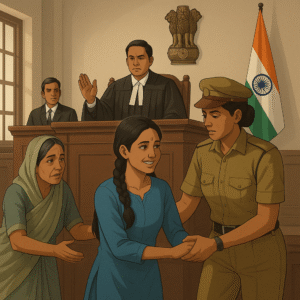Simplified Explanation of the Judgment
The Patna High Court, in its detailed judgment delivered in 2021, dismissed an appeal filed by several candidates who had challenged their rejection by the Bihar State Food and Civil Supplies Corporation Limited (BSFCSCL) in the recruitment process for the post of Assistant Manager (General Administration).
The dispute centered on whether degrees such as Master in Human Resource Management (MHRM) or Master in Personnel Management and Industrial Relations (PMIR) could be treated as equivalent to Master in Business Administration (MBA) or Post Graduate Diploma in Business Management (PGDBM) for eligibility purposes.
The Division Bench — comprising Hon’ble the Chief Justice and Hon’ble Mr. Justice S. Kumar — upheld the decision of the Single Judge, who had earlier dismissed the writ petition filed by these candidates. The Court made it clear that the question of “equivalence of qualifications” lies within the domain of the recruiting authority or the expert body, and not the courts.
Background of the Case
BSFCSCL had issued an advertisement inviting applications for the posts of Assistant Manager and Assistant Accountant. For the post of Assistant Manager (General Administration), the essential qualification prescribed was:
“MBA/PGDBM from a recognized University or Institute approved by AICTE.”
Several candidates who held postgraduate degrees in related subjects such as MHRM, PMIR, or MA (Personnel Management) applied for the post, claiming that these were equivalent to MBA/PGDBM, particularly because they had studied management-related subjects.
However, during document verification, the BSFCSCL rejected their applications, stating that their degrees did not meet the precise educational qualification criteria. The candidates filed writ petitions challenging the rejection, but the Single Judge dismissed them, leading to the present Letters Patent Appeal (LPA No. 210 of 2019 and analogous cases).
Arguments by the Appellants (Candidates)
The appellants contended that:
- Their courses, such as MHRM and PMIR, covered the same subjects and syllabus as MBA courses, focusing on management, administration, and industrial relations.
- They were treated as equivalent in several other recruitment processes, including in public sector undertakings and universities.
- The rejection was arbitrary and violated their right to equality (Article 14) because the corporation did not conduct any comparative assessment before denying equivalence.
- They relied on past instances where candidates with similar qualifications were accepted for comparable posts.
Essentially, the appellants argued that their degrees were functionally and academically equivalent to MBA, and therefore, the BSFCSCL should have accepted them for the Assistant Manager post.
Arguments by the Respondents (BSFCSCL and State)
The BSFCSCL maintained that:
- The advertisement explicitly mentioned MBA/PGDBM as the qualification.
- The recruiting body cannot alter or interpret qualifications beyond what is mentioned in the advertisement.
- The AICTE (All India Council for Technical Education) does not treat MHRM or PMIR as equivalent to MBA/PGDBM, as they are separate courses with different focuses.
- Determining “equivalence” of degrees requires expert evaluation, not judicial interpretation.
- The courts have consistently held that eligibility criteria cannot be diluted or extended beyond what the employer prescribes.
They relied on precedents from the Supreme Court, including:
- Zahoor Ahmad Rather & Ors. v. Sheikh Imtiyaz Ahmad & Ors., (2019) 2 SCC 404
- State of Rajasthan v. Lata Arun, (2002) 6 SCC 252
- P.M. Latha v. State of Kerala, (2003) 3 SCC 541
These cases establish that the employer’s view on qualification requirements prevails, and the courts should not interfere unless the condition is irrational or discriminatory.
Observations of the Patna High Court
The Division Bench agreed with the Single Judge and held that the appellants’ degrees were not equivalent to MBA or PGDBM.
The Court observed that:
- Recruitment qualifications are a matter of policy and must be determined by the appointing authority.
- Courts cannot rewrite eligibility criteria or declare one qualification equivalent to another unless such equivalence is expressly provided by the recruiting body or statutory authority.
- Equivalence cannot be claimed merely on the basis of similar syllabus content. What matters is official recognition or equivalence notification by the competent academic or regulatory body.
- The BSFCSCL had acted consistently with its advertisement and therefore committed no illegality.
The Court cited the Supreme Court’s pronouncement in Zahoor Ahmad Rather (2019), which warned that judicial interference in recruitment qualifications “may lead to chaos in public employment.”
Decision and Result
The High Court concluded that the appellants were rightly disqualified for not meeting the prescribed qualification. The Letters Patent Appeals were dismissed with the following findings:
- MHRM and PMIR degrees are distinct from MBA/PGDBM and cannot be considered equivalent in absence of formal recognition.
- Courts cannot determine equivalence — that power lies with the recruiting or academic body.
- The employer (BSFCSCL) acted within its rights and in conformity with law.
The judgment reaffirmed that judicial review is limited to checking fairness of the process, not reinterpreting academic qualifications.
Significance or Implication of the Judgment
This ruling is significant for both job aspirants and recruiting agencies in Bihar and across India. It clarifies that:
- Educational qualifications must match exactly what is stated in recruitment advertisements.
- Equivalence cannot be presumed merely because two courses appear similar in subject matter.
- Candidates should ensure that their degree is officially recognized as equivalent before applying.
- Courts will defer to the opinion of expert bodies such as AICTE, UGC, or recruiting agencies in matters of academic equivalence.
For recruiting authorities, this judgment provides judicial support for maintaining strict adherence to prescribed qualifications, preventing litigation and ambiguity in selection processes.
Legal Issue(s) Decided and the Court’s Decision with Reasoning
- Issue 1: Whether MHRM or PMIR degrees are equivalent to MBA/PGDBM for Assistant Manager recruitment.
➤ Decision: No. The Court held there is no official equivalence; hence, the candidates were ineligible. - Issue 2: Whether the employer can insist on a specific qualification without granting equivalence.
➤ Decision: Yes. Determining eligibility lies within the employer’s discretion. - Issue 3: Whether courts can interfere in deciding equivalence of educational qualifications.
➤ Decision: No. The matter belongs to expert authorities and not to judicial review.
Judgments Referred by Parties
- Zahoor Ahmad Rather v. Sheikh Imtiyaz Ahmad, (2019) 2 SCC 404
- P.M. Latha v. State of Kerala, (2003) 3 SCC 541
- State of Rajasthan v. Lata Arun, (2002) 6 SCC 252
Judgments Relied Upon or Cited by the Court
- Zahoor Ahmad Rather v. Sheikh Imtiyaz Ahmad, (2019) 2 SCC 404
- A.P. Public Service Commission v. B. Sarat Chandra, (1990) 2 SCC 669
- State of Haryana v. Subhash Chander Marwaha, (1974) 3 SCC 220
Case Title
Ratnakar Kumar & Ors. v. The State of Bihar & Ors.
Case Number
Letters Patent Appeal No. 210 of 2019 (arising out of CWJC No. 16685 of 2018)
Citation(s)
2021(2) PLJR 822
Coram and Names of Judges
Hon’ble the Chief Justice
Hon’ble Mr. Justice S. Kumar
Names of Advocates and Who They Appeared For
Mr. S.B.K. Mangalam — for the appellants
Mr. Lalit Kishore, Advocate General — for the State
Mr. Piyush Lal — for the Corporation (BSFCSCL)
Link to Judgment
MyMyMTAjMjAxOSMxI04=-A–ak1–z6lBNlEug=
If you found this explanation helpful and wish to stay informed about how legal developments may affect your rights in Bihar, you may consider following Samvida Law Associates for more updates.








